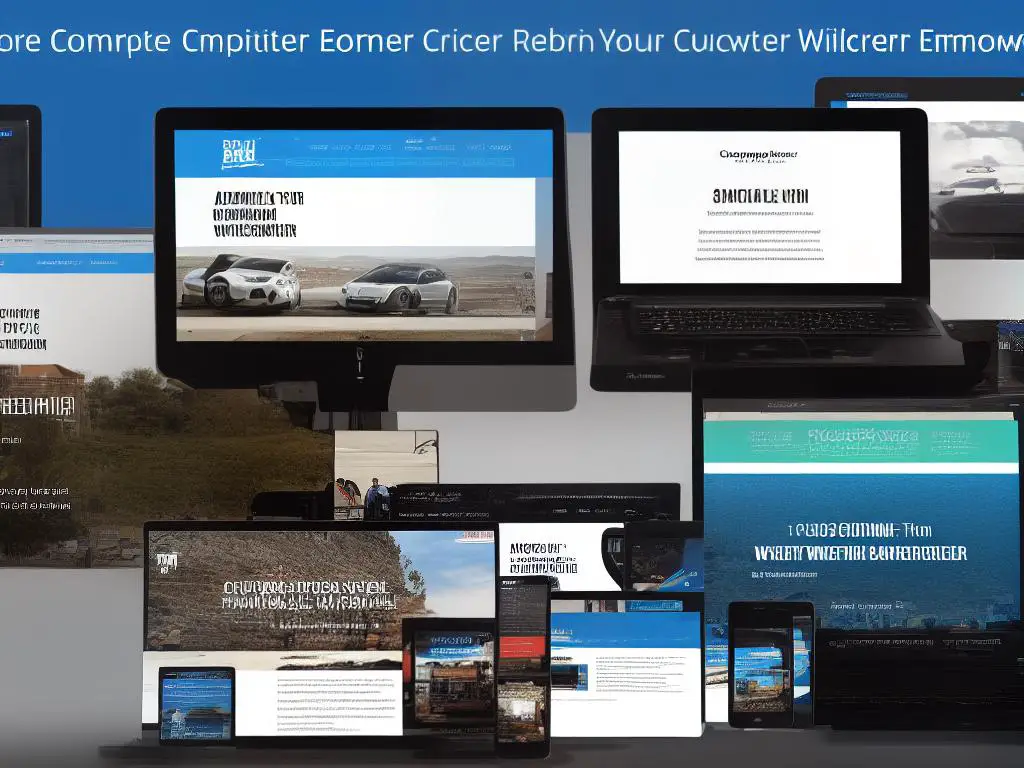With the ever-growing digital landscape, creating a niche website can be a lucrative opportunity to capitalize on your unique interests and expertise. In this article, we will explore the key aspects of building a successful niche website – from identifying your target audience to driving traffic and monetizing your content.
Understanding Niche Websites
Niche websites are websites that focus on a specific topic, interest, or demographic. Unlike general websites, which cover a wide range of subjects and cater to broad audiences, niche websites aim to provide relevant and specialized content to address a target audience’s unique needs and preferences. Due to their specialized nature, niche websites can build a strong community of loyal followers and cater to a more dedicated user base.
Niche websites can thrive when they are built around a lucrative niche with a strong demand, as they fill a gap in the market that broad websites might not cater to effectively. The advent of various online tools and platforms, coupled with the growth of digital marketing, has made it easier to create, manage, and promote niche websites. This means that even individuals with limited technical skills can create a niche website and generate income through advertising, sponsorships, or product sales.
With the ongoing global digital transformation, there has never been a better time to consider starting a niche website. As more individuals seek specialized content tailored to their specific interests, niche websites offer valuable resources and can attract a dedicated audience. Additionally, search engines generally favor highly specialized content, leading to improved visibility and increased website traffic. Therefore, now is an excellent time to launch a niche website, as long as you thoroughly research your target market and consistently produce high-quality, relevant content.

Market Research & Niche Selection
Embarking on comprehensive market research is a crucial initial step when contemplating the creation of a niche website. This research enables you to identify trends and areas of demand where your site has the potential to flourish. By staying attuned to market trends, cultural shifts, and general consumer behavior, you can gauge the viability of your niche website idea and assess its potential to serve a specific target audience. Furthermore, it’s essential to evaluate the competitive landscape by examining the strengths and weaknesses of potential competitors within your chosen niche.
Selecting a niche that resonates with the target audience and can turn into a profitable venture requires a deep understanding of consumer needs and desires. A successful niche site typically fills a gap in the market, providing valuable content or solutions that cater to a specific group’s interests or needs. Tools such as Google Trends and keyword research can help identify popular topics within the niche market while also revealing gaps in content or underrepresented areas. This information can be used to attract and retain a loyal audience, who may appreciate the unique perspective that the niche website offers.
With the global increase in internet usage and advancements in technology, now may be an excellent time to start a niche website. The ease of creating and maintaining a website, paired with the vast potential reach of online content, means that even a narrowly focused site can attract a sizeable and dedicated audience. By leveraging social media platforms and other digital marketing channels, a niche website can expand its reach and enhance its visibility, thus increasing the chances of success. In summary, by conducting thorough market research, identifying trends and gaps, and selecting a well-researched niche that resonates with the target audience, one can tap into the growing potential of online content and launch a successful niche website.

Content Strategy & Planning
One essential aspect of starting a niche website is developing a robust content strategy and plan that effectively targets your desired audience. This begins with comprehensive keyword research to identify the most relevant, high-traffic topics your target audience is searching for within your niche. By incorporating these researched keywords into your content strategically, you can significantly improve your website’s search engine rankings, making it easier for potential readers to find and engage with your site. As the demand for specialized content continues to grow, now may be an ideal time to establish your niche website and capitalize on the increased online traffic.
Creating high-quality, engaging content that resonates with your audience is crucial to the success of your niche website. Dedicating time to consistently brainstorming and writing valuable content is of utmost importance. In addition, this content should be informative, visually appealing, and shareable to generate organic discussion and increase user retention.
A critical aspect of this process is developing an editorial calendar, which helps outline your content plan and maintain a consistent schedule of publishing. Mapping out your content on a calendar further enhances your ability to present thoughtfully and well-organized content to your audience.Creating captivating content and continuously optimizing and expanding your content strategy are essential for long-term success in today’s competitive digital landscape. Regularly monitoring your website’s performance metrics and audience engagement will enable you to adapt your content plan accordingly. This may involve refining target keywords, experimenting with new content formats, or adjusting your posting frequency. By implementing a feedback loop and developing a flexible and dynamic content strategy, you can maintain a successful niche website in an increasingly competitive online environment.

Website Design & User Experience
In the current climate for starting a niche website, it is important to evaluate the impact of website design and user experience on its potential for success. A well-designed website with a focus on user experience not only attracts more visitors but also keeps them engaged, leading to lower bounce rates and higher chances of conversions. A visually appealing site with intuitively organized content and easy navigation ensures seamless interaction and accessibility, which is crucial for niche websites that cater to specific interests or industries. As internet users become more selective and discerning, paying attention to design and user experience can make the difference between a thriving niche website and one that fades into obscurity.Optimizing for mobile is another crucial aspect of website design in today’s digital landscape.
The majority of web traffic is increasingly coming from mobile devices, and a poorly optimized site can lead to a significant loss in potential audience and revenue. Ensuring that your niche website is responsive and adapts seamlessly across various screen sizes and devices is essential to providing an enjoyable browsing experience to all visitors, regardless of the device they are using.In today’s competitive digital market, it is essential to have a well-designed, optimized, and fast-loading niche website to attract and retain users. Advancements in technology have significantly increased user expectations for fast-loading sites. To ensure a seamless user experience, it is crucial to invest in high-quality web hosting, streamline your code, and optimize images for the best possible load times. Building a strong foundation for your niche website by offering impressive design, a smooth mobile experience, and quick load times will keep your users engaged and coming back for more.

SEO & Organic Traffic
Another critical aspect of starting a successful niche website is search engine optimization (SEO). This practice helps to drive organic traffic to your site from search engines like Google.
Considering the constant updates to search engine algorithms, staying well-informed about SEO best practices is essential to ensure your content ranks favorably in search results.
With growing online competition, targeting niche keywords and producing high-quality, relevant content is an effective strategy for standing out and attracting the right audience to your website.
When starting a niche website, it is essential to identify the right keywords and incorporate them into your on-page and off-page SEO strategies.
On-page SEO refers to the optimization of website elements such as page titles, headings, and content, as well as any images or videos. Off-page SEO, on the other hand, pertains to external factors like backlinks, social media shares, and guest posts.
Conducting keyword research and understanding your target audience’s preferences will help inform your SEO strategy and ensure that your website ranks high on search engine results pages (SERPs).
Creating a niche website can be a profitable venture in today’s competitive digital environment, provided that it offers valuable and high-quality content. The success of your website hinges not only on appropriate SEO implementation but also on presenting meaningful and informative content to your target audience.
By consistently providing well-researched and relevant information within your niche, you can establish your authority in your field and attract more organic traffic to your website.
In addition, creating engaging and shareable content will enhance your website’s visibility, effectively bolstering your SEO efforts and driving organic traffic.

Monetization Strategies
As the internet continues to expand and grow, there are ample opportunities to create a successful niche website. One critical aspect of ensuring success is identifying effective monetization strategies for your site. By carefully selecting the right approach, a niche website can not only generate a consistent income stream but also provide value to its targeted audience. In this way, a well-planned and content-rich niche website holds the potential to become a lucrative endeavor in the constantly evolving digital world.
Affiliate marketing is a time-tested method for monetizing niche websites. It involves partnering with companies that offer products or services relevant to a niche topic. Website owners can promote these products or services by placing affiliate links on their website, earning a commission for each sale or lead generated through those links. This approach is particularly suitable for niche websites as they often have a highly targeted audience that possesses a clear interest in the niche segment, which generally leads to a higher conversion rate compared to mainstream websites.Another popular monetization strategy for niche websites is display advertising, where website owners place ads on their site and generate revenue based on ad impressions or clicks.
There are various ad networks available for niche website owners, including Google AdSense, which serve ads based on the site’s content and user interests. Selling digital products or services is also a viable option for niche websites. This can include offering ebooks, online courses, or consultancy services, which provide value and expertise on a specific topic. By focusing on the unique needs and interests of a niche audience, website owners can create tailored products or services that generate sales and foster loyal customers.In summary, starting a niche website in today’s digital age presents various monetization opportunities.
These include affiliate marketing, display advertising, and selling digital products or services tailored to a niche audience. However, it should be noted that achieving success with a niche website is not only about implementing monetization strategies but also about providing valuable, relevant content that resonates with the targeted community and cultivating a sustainable online presence.

Promotion & Social Media
With the importance of promotion and the ever-growing role of social media, driving traffic to your website and engaging with your target audience becomes crucial. The digital landscape of today requires online businesses to adapt and make use of multiple promotional channels to effectively reach their desired market.
Many social media platforms, such as Facebook, Instagram, and Pinterest, provide powerful tools for niche website owners to promote their content and attract a loyal and engaged audience. By employing strategic social media marketing techniques, you can create a sense of community around your niche, fostering loyalty and driving long-term growth. One example would be engaging with your audience by responding to comments and sharing user-generated content, which can establish a sense of trust with your site visitors.
To effectively utilize these platforms, it’s important to generate content that will resonate with your target audience. Understanding your niche well helps in crafting engaging promotional material that will pique the unique interests and preferences of your market. Additionally, continuously monitoring and analyzing data from your social media channels can provide valuable insights into customer behavior and preferences, allowing for further optimization of your content. This process leads to increased engagement and ultimately results in higher traffic and success for your niche website.

Tracking, Analytics & Improvement
Continuous monitoring and analysis of data from social media channels can provide valuable insights into customer behavior, allowing for further optimization of content. This ongoing process can lead to increased engagement, ultimately resulting in higher traffic and success for your niche website. In the rapidly evolving digital world, it’s essential not only to leverage advanced promotional channels but also to track and analyze the website’s performance for sustainable growth and success.
Website analytics data, such as visits, user behavior, and conversion rates, are invaluable for understanding the needs and preferences of your target audience. This information can be used to fine-tune marketing strategies and allocate resources effectively, driving more organic traffic and engagement. Fortunately, a wealth of analytics tools and platforms are available, making it easier than ever to make data-driven decisions that yield optimal results.
Additionally, the online landscape is vast and constantly changing, so adapting to new trends is crucial. A competitive analysis is essential to identify opportunities for improvement and growth.
Evaluating your niche website’s performance against similar websites allows you to pinpoint your strengths and weaknesses, identify new content ideas, and attract the right audience. Thus, regular in-depth analyses of your website are essential to ensure it remains functional, relevant, and increasingly successful.
Moreover, adopting a test-and-learn approach helps to identify the most effective methods to improve your niche website. Performing A/B testing on elements such as landing pages, design, and marketing messages gives you insight into what resonates most with your audience, ultimately maximizing your return on investment.
It is important to embrace an iterative methodology that allows for constant optimization in response to changing user trends and emerging competitors in the niche. By measuring key performance indicators and implementing a continuous improvement plan, your niche website will be well-positioned for long-term success in the dynamic digital environment.”

By mastering the fundamentals of niche website creation, from market research to promotion and analytics, you’ll be well on your way to launching a profitable online platform tailored to your specific area of interest. So get started today, and turn your passion into a thriving digital presence that fills the gap in the market and connects you with your ideal audience.

